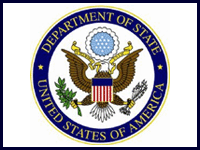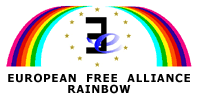 Macedonian Human Rights Movement International (MHRMI) - Press Release
Macedonian Human Rights Movement International (MHRMI) - Press Release
The European Free Alliance – Rainbow, the political party of the Macedonian minority of Greece, the Australian Macedonian Human Rights Committee (AMHRC) and Macedonian Human Rights Movement International (MHRMI) call upon the international community to demand that the Greek government take action to end its human rights violations in light of the US State Department’s annual report on human rights practices in Greece.
Yet again, the denial of the rights of the Macedonian minority featured in this year’s report. In respect of freedom of association, the State Department noted that the “government continued to refuse to allow the registration of the group Home of Macedonian Culture as an association in accordance with the provisions of the civil code” and that “[d]uring the year international organizations and NGOs expressed concern that this practice violated freedom of association.” A similar problem also existed in relation to Turkish cultural associations.
The report also observed that “at least a dozen unidentified men violently disrupted a presentation of a new Greek-Macedonian dictionary and a speech by a Western linguist and academic at the Foreign Press Association in Athens. The reports alleged that the men damaged banners and video equipment and injured at least one reporter. Allegedly, they were members of the ultra-nationalist group Golden Dawn.” This neo-Nazi group is tolerated by the state and fully participates in the political life of Greece.
Also noteworthy was the US State Department’s acknowledgment of the report issued in March 2009 by the UN Independent Expert on Minority Issues, Ms Gay McDougall, in which she “urged the government to withdraw from the dispute over whether there is a Macedonian or a Turkish ethnic minority in the country and focus instead on protecting the rights to self-identification, freedom of expression, and freedom of association of those communities and complying fully with the rulings of the ECHR that associations should be allowed to use the words “Macedonian” and “Turkish” in their names and to express their ethnic identities freely. The independent expert found that those identifying themselves as ethnic Macedonians still reported discrimination and harassment. Representatives of this minority claimed that they were denied the right to freedom of association, citing unsuccessful efforts since 1990 to register the organization “Home of Macedonian Culture” in Florina.”
Although EFA-Rainbow, the AMHRC and MHRMI welcome the inclusion of the aforementioned information in the report, there were some notable omissions which could have strengthened the report and thus given a better picture of the human rights situation in Greece. For example, the report makes no mention of the Macedonian political refugees who were driven out of Greece during the Civil War in Greece and are prevented from returning to Greece to reclaim citizenship and property rights due to fundamentally discriminatory laws enacted in 1982 and 1985 respectively which only afford such rights to “Greeks by genus”. In 2009 this discrimination was noted by the UN Independent Expert on Minority Issues, the European Commission against Racism and Intolerance (ECRI) and most recently again in a report authored by Boris Cilevics of the Parliamentary Assembly of the Council of Europe (PACE). In the section on religious freedom, the State Department failed to mention the continual persecution of Father Nikodim Tsarknias and the denial of church services in the Macedonian language.
Furthermore, a number of inaccuracies in the State Department report must also be pointed out. Firstly the Macedonian language is not just spoken in the “northwestern area of the country” i.e. in the Region of Western Macedonia as the report suggests, but also in the north-central part of the country, namely in the Region of Central Macedonia i.e. around the towns of Edessa/Voden, Naoussa/Negush etc. Secondly, in relation to the statement that “a small number of Slavic speakers insisted on identifying themselves as “Macedonian” we wish to state it is unacceptable (and inaccurate) to declare that the number of persons in Northern Greece that identify as Macedonian by ethnicity and the number of people that speak the Macedonian language is “small”. Given the fact that in Greece no data on questions of ethnic and linguistic identity are collected in the census, it is most inappropriate for the State Department (and indeed the Greek government) to speculate on the numbers. EFA-Rainbow, AMHRC and MHRMI strongly urge the international community to require the Greek government, under international supervision, to collect data on ethnic and linguistic diversity at the next national census in 2011.
In relation to the report’s claims that “Government officials and the courts denied requests by Slavic groups to identify themselves using the term “Macedonian,” stating that approximately 2.2 million ethnically (and linguistically) Greek citizens also use the term “Macedonian” to identify themselves”, we would like to state, as indeed we have in the past, that this is a poor attempt on the part of the Greek government to manipulate matters. Ethnic Greek citizens who might identify as “Macedonian” do so in a regional/geographic sense (and many also identify as Pontians, Refugees, etc in light of the fact that a considerable number of them settled in Greece from Asia Minor after 1923), while other Greek citizens identify as Macedonian in an ethno-cultural sense. The claim that some ethnic Greeks add a geographical/regional qualifier to their main ethnic identity marker (“Greek”) cannot serve as a justification for denying Macedonians their right to an ethnic identity. The right to self-identification is of crucial existential significance and must be respected. These points should have been acknowledged by the State Department in its report and the Greek response should not have been presented in the manner that it was, which seemed to be attempting to provide a ‘justification’ for the discriminatory policies of the Greek state.
Finally, EFA-Rainbow, AMHRC and MHRMI this year must once again strongly condemn the State Department’s use of the terms “Slavic dialect” and “Slavic groups”. These are not terms of self-identification and it would be appropriate that in issuing a human rights report, the State Department would indeed respect the principle of self-identification and refer to this group and their language simply as Macedonian. These terms have long been in pejorative use in Greece and have been utilised in conjunction with attempts to violently assimilate and even exterminate Macedonians. We trust that this error will be corrected in next year’s report.
The 2010 report on Greece can be found here http://www.state.gov/g/drl/rls/hrrpt/2009/eur/136034.htm
###
The European Free Alliance – Rainbow is the political party of the Macedonian minority in Greece. The party has offices in Florina/Lerin and Edessa/Voden. For more information please visit www.florina.org, or by email: vinozito@otenet.gr or on +30 23850 46548.
Established in 1984 the Australian Macedonian Human Rights Committee (AMHRC) is a non governmental organisation that informs and advocates to governments, international institutions and broader communities about combating discrimination and promoting basic human rights. Our aspiration is to ensure that Macedonian communities and other excluded groups throughout the world are recognised, respected and afforded equitable treatment. For more information please visit www.macedonianhr.org.au, or contact AMHRC at macedonian_rights@hotmail.com or via +61 3 93298960.
Macedonian Human Rights Movement International (MHRMI) has been active on human and national rights issues for Macedonians and other
oppressed peoples since 1986. For more information, please visit www.mhrmi.org,
or contact MHRMI at 416-850-7125, or info@mhrmi.org. |












 Macedonian Human Rights Movement International (MHRMI) - Press Release
Macedonian Human Rights Movement International (MHRMI) - Press Release















